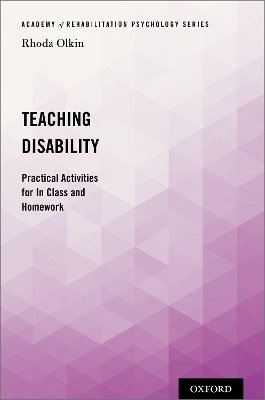
Teaching Disability
Oxford University Press Inc (Verlag)
978-0-19-085066-1 (ISBN)
This book takes a nonpathological approach to disability, viewing it as part of diversity rather than as deficit. The opening chapters introduce basic knowledge of teaching in disability communities, covering attitudes and behaviors that may be difficult for instructors to relate to. Next, the book delves into the three activities sections that increase in difficulty over the course of the book. The activities highlight barriers and psychosocial impediments that hamper progress in disability communities. Designed by an expert educator and clinician who is also an insider in the disability community, each of the 34 activities translate well in classroom environments or as homework, and each can be done individually or in group settings. All activities include a list of required materials, time expectation, goal setting criteria, possible outcomes, and talking and debriefing points for reflection, thereby facilitating effective planning and execution. The activities also recommend possible modifications to adjust the difficulty of the activities. This flexibility makes this a valuable resource for a wider audience of expertise and settings, ranging from introductory to sophisticated readers and users, students and non-students, in classrooms, in workshops, or in other surroundings.
Lastly, the book concludes with a chapter on accessing outcomes, with six measures for evaluating knowledge and skill. Teaching Disability is a well-rounded, highly applicable tool for instructors and students in the disability community.
Dr. Rhoda Olkin received her PhD from University of California, Santa Barbara, and her BA from Stanford University. Since 1990, she has been a Distinguished Professor in a clinical PsyD program, where she trains therapists and teaches about working with clients with disabilities. She has extensive publications, presentations, and clinical experience related to disability and chronic health conditions.
PART A: BACKGROUND AND BASICS
Chapter 1: Introduction for Instructors
Chapter 2: Attitudes, Knowledge and Behavior
PART B: BEGINNING LEVEL EXERCISES
Chapter 3: Exploring the Basics
Chapter 4: Hearing from Insiders
Chapter 5: Laws and How They Affect Everyday Life
Chapter 6: Models of Disability
Chapter 7: Everyday Issues
Chapter 8: Watching Films
PART C: MORE ADVANCED EXERCISES
Chapter 9: Disability in Context of Family, Friends, Community
Chapter 10: Immersion and Activism
PART D: CONCLUSIONS
Chapter 11: Assessing Outcomes
| Erscheinungsdatum | 28.07.2021 |
|---|---|
| Reihe/Serie | Academy of Rehabilitation Psychology Series |
| Verlagsort | New York |
| Sprache | englisch |
| Maße | 236 x 156 mm |
| Gewicht | 322 g |
| Themenwelt | Geisteswissenschaften ► Psychologie ► Biopsychologie / Neurowissenschaften |
| Medizin / Pharmazie ► Physiotherapie / Ergotherapie ► Rehabilitation | |
| Sozialwissenschaften ► Soziologie | |
| ISBN-10 | 0-19-085066-3 / 0190850663 |
| ISBN-13 | 978-0-19-085066-1 / 9780190850661 |
| Zustand | Neuware |
| Informationen gemäß Produktsicherheitsverordnung (GPSR) | |
| Haben Sie eine Frage zum Produkt? |
aus dem Bereich


